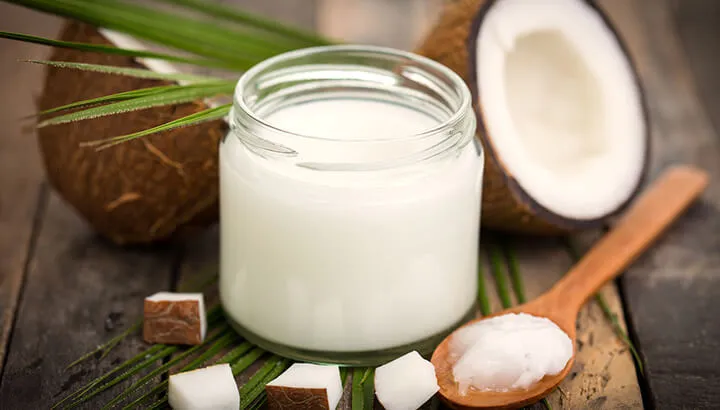Have you ever dealt with dry, itchy eyes? They may sting, feel gritty or overly sensitive. This is a common condition that affects as many as one in three people. Now, what if I told you that using coconut oil for eyes could ease discomfort naturally?
Also known as keratitis sicca or xerophthalmia, dry eyes can result when tear fluid is produced too slowly or evaporates too quickly. While it’s common to ease discomfort the obvious way — by adding more fluid to the eyes in the form of eye drops — it’s important to investigate what’s behind this seemingly simple, yet potentially complex problem.
What causes dry eyes?
Dry eyes are more common in older people, but the problem can occur at any age. There are many factors that contribute to temporary or chronic dry eyes. For example, a number of medications may cause eye discomfort as a side effect:
- Diuretics
- ACE (angiotensin-converting enzyme) inhibitors
- Antihistamines
- Decongestants
- Sleeping pills
- Birth control pills
- Antidepressants
- Acne medications with isotretinoin
- Morphine and other opiates
Dry eyes can also be tied to medical conditions which affect the eyes and tear ducts. Some of these illnesses include shingles, Bell’s palsy, HIV, diabetes, arthritis and lupus. Skin conditions such as rosacea can also result in inflammation along the eyelids or clogged glands, interfering with healthy tear production.
Other causes of dry eyes
Dry eyes may also be caused by Lasik surgery, a surgical procedure that uses a laser to correct nearsightedness, farsightedness and/or astigmatism. A study conducted by the Department of Ophthalmology and Visual Sciences at the University of Michigan concluded that post-Lasik dry eye is extremely common. It affects approximately 20 to 40 percent of patients and can be a significant problem for patients and their eye-care providers. And with about one million procedures completed annually, that’s a lot of people suffering from dry eye syndrome.
Another little-known culprit behind dry eyes is a dangerous nutritional deficiency. Those lacking vitamin A can easily develop dry eyes. Other nutritional deficiencies can also hinder eye health.
Menopause with its associated hormonal changes is also commonly linked with dry eye syndrome. In fact, research published in JAMA Ophthalmology reports that dry eyes affect 60 percent of menopausal women. Additionally, women are almost three times more likely than men to have the condition. While most cases are seen after menopause, some women with premature ovarian failure may also develop a higher risk of dry eye.
But, for most people, dry eyes are usually the result of too much time spent in front of the computer, television or even outdoors in the wind and sun.
Coconut oil for eyes

I have had dry eyes for as long as I can remember. This may be partly due to the fact that I work online — spending a lot of time in front of a computer tends to dry out anyone’s eyes. I also think that there is a hereditary component to my dry eyes, as my father also has this condition. Add contacts to the mix and my eyes often feel uncomfortable by the end of the day.
When my dry eyes become unbearable, I generally reach for some kind of ocular lubricant (a solution specially formulated to moisten the eyes) found in most drugstores. However, after some research on my favorite natural solution, I found, even to my surprise, that I could use coconut oil in my tired and sore eyes.
Normal eye function
Under normal circumstances, our eyes produce tears on a constant basis. Tears come out of tiny ducts and glands in the corners of the eyes and along the eyelids. The fluid is made up of three layers: oil, salt water and mucus. These form a film that assists vision and keeps eyes clear and comfortable in the time between blinking.
When the eyes become too dry, they can get red, painful and sensitive to light. Even eyesight may begin to suffer as a consequence of a lack of moisture.
Dangers of over-the-counter remedies
Like many conditions, there are a plethora of “remedies” available for dry eye syndrome at your local drugstore. Americans spend more than $300 million annually on artificial tear drops and over-the-counter treatments. But sadly, there’s no actual cure that comes in prescription form.
Like me, you may be slightly overwhelmed when you walk down the aisle. I have tried many products over the years. Some help take out the redness, others seems to offer some temporary relief to the dryness, but few can handle my condition like my favorite natural solution… coconut oil.
For years, I have studied, read about, written about and put into practice what I know about coconut oil. However, until just recently, I had never put this tropical wonder in my eyes. It never occurred to me to use coconut oil for my dry eyes problem, until a friend of mine suggested it to me.
What my research uncovered
Like all things, I like to do my research before trying anything new, even with my tried-and-trusted coconut oil. As expected, I uncovered quite a bit of anecdotal evidence regarding the effectiveness of using coconut oil for eyes, as well as one recent pilot study published in the Journal Complementary and Alternative Medicine.
In this study, three rewetting substances were compared: virgin coconut oil, Tears Naturale II and a saline solution (as a control). The purpose of the study was to explore the efficacy of virgin coconut oil as an ocular rewetting agent on rabbit eyes.
Researchers divided nine rabbits into groups and assigned each group with one of the three different eye drops. For the purpose of the study, the contents of each bottle were concealed to researchers. Drops were instilled topically in the tested eye — three times daily, for two weeks — with a follow-up after the 14th day.
The study demonstrated that using coconut oil for eyes was successful in reducing dry eyes. Study leaders noted that the oil did not cause any harmful effects on the rabbit’s eyes and that it might be useful for humans with dry eyes. In fact, research suggests that virgin coconut oil even works in the same way that commercial eye drops and saline solutions do. That’s not surprising since coconut oil’s anti-inflammatory properties are similar to natural tears.
This information, combined with the anecdotal reports I found, was enough to convince me to try some organic coconut oil for my dry eyes. After all, I know the reasons why coconut oil is so amazing, and it really made sense to me that it could help dry and tired eyes.
What I know about coconut oil
When people ask me why coconut oil is so amazing, I generally refer to what I have termed the eleven A’s — it helps me to remember all of the amazing properties of this natural wonder. Many of these properties can help to keep your eyes well lubricated and healthy.
- Antibacterial — Stops bacteria that cause gum disease, throat infections, urinary tract infections and ulcers in their tracks.
- Anticarcinogenic — Keeps dangerous cancer cells from spreading, while boosting immunity.
- Antifungal — Destroys infection-promoting fungus and yeast.
- Anti-inflammatory — Suppresses inflammation and repairs tissue.
- Antimicrobial — Deactivates harmful microbes and fights infection.
- Antioxidant — Protects from free radical damage.
- Antiretroviral — Destroys HIV and HTLV-1.
- Antiparasitic — Rids the body of lice, tapeworms and other parasites.
- Antiprotozoal — Kills protozoal infection in the gut.
- Antiviral — Kills viruses that cause influenza, herpes, measles, AIDS, hepatitis and more.
- Absorption — Very easy to digest and makes nutrients readily available.
A word about lauric and capric acid
Coconut oil is loaded with a very powerful antimicrobial fatty acid called lauric acid, also found in breast milk. In the body, lauric acid is converted to monolaurin, which is a potent antiviral, antibacterial and antiprotozoal substance.
Coconut oil also contains another fatty acid: capric acid. Capric acid is present in very small amounts in goat’s milk and cow’s milk, but is abundant in tropical oils, including coconut oil and palm kernel oil.
It is a medium-chain fatty acid that has antimicrobial and antiviral properties. In the body, capric acid is converted to monocaprin, a form that can readily fight viruses, bacteria and the yeast Candida albicans.
How I used coconut oil
In order to liquefy the coconut oil, I ran some hot water from the tap and put it in a small bowl. In an even smaller bowl, I added about a teaspoon of coconut oil. I placed the smaller bowl in the larger bowl until the oil liquefied. Whatever you do, don’t use a microwave to melt your coconut oil. Microwaves change the molecular structure of the oil and kills the lauric acid that makes coconut oil so valuable.
Once the oil was liquefied, I let it cool and used a small glass dropper to withdraw some from the bowl. I tipped my head back and put a few drops in each eye. For a couple of minutes, my eyes were cloudy, but soon they cleared right up.
I did this twice a day, morning and evening, for a week and found there was a substantial decrease in dryness. I seemed to be producing more natural tears and my eyes did not feel nearly as tired by the end of the day.
In addition to dropping the coconut oil into my eyes, I also put a little around my eyes at night. This helped to soften and moisturize the skin around my eyes.
I am happy to report that I am now putting the drops in my eyes about three times a week and they seem to be doing the trick. No more over-the-counter lubricating drops for me… coconut oil wins again!
Things to avoid if you have dry eyes
In addition to the use of coconut oil as an ocular lubricant, it can be helpful to steer clear of potential irritants to your eyes, such as cigarette smoke. Tobacco contains more than 4,000 different chemicals including formaldehyde and acetone. Many of these chemicals are toxic and several of these toxins aggravate the eyes — not to mention poisonous to eye tissue. In fact, smokers may be twice as likely to suffer from dry-eye syndrome as non-smokers.
A study published in the American Journal of Ophthalmology set out to find the effects of smoking cigarettes on the eyes. Researchers found that smoking has deteriorating effects on the lipid layer and tear film. The lipid layer of the eye is directly responsible for lubricating and preventing the evaporation of tears. Insufficient lubrication means dry, itchy eyes. And take note: even if you don’t smoke, exposure to secondhand smoke will also irritate the tear film.
Alcohol is another potential irritant for dry eyes. Findings from a study published in the Journal of the American Academy of Ophthalmology suggest that consuming even a small amount of alcohol may increase and exasperate symptoms of dry eyes.
Here is a list of things that may dry out your eyes. Try to avoid the following:
- Prolonged computer use
- Smoking
- Alcohol
- Air conditioning
- Excessive caffeine consumption
- Dry and windy environments
- Rubbing your eyes
Foods to help dry eye syndrome
Now that you know what to avoid, here are some foods that will help boost your production of natural tears. The food you eat can have a significant effect on the health of your eyes, either supporting healthy vision in the long term or contributing to faster degradation.
Be sure to consume enough vitamin A, both in plant — red, yellow and dark green vegetables — and animal forms. Plants such as carrots, peppers and squash contain carotene, which is converted to vitamin A in the body. Liver and eggs contain retinol, which is the more active animal-based form of vitamin A. Cod liver oil is an excellent way to get enough of the retinol type of vitamin A in your diet.
Another nutrient that is vital for healthy eyes is omega-3 fatty acid. This is a key ingredient in keeping tissues flexible and lubricated and helps form the oily layer on healthy eyes. You can find omega-3 fats in cold-water fish species such as salmon, herring, mackerel and sardines. Plant sources of omega 3s include walnuts, flaxseed oil, hemp oil, olive oil and pumpkin seeds.
Zinc is also important for normal eye function. Some good food sources of zinc include fish, kelp, liver, mushrooms, pumpkin seeds and sunflower seeds. The seeds also contain vitamin E, which supports eye health as well.
Many of the other medical conditions that can cause dry eyes are tied to the immune system and hormonal imbalance. Therefore a robust diet based on real, whole foods will be very helpful in correcting these underlying imbalances.
Wrinkles under eyes
Unfortunately, with dry, itchy eyes also comes excessive rubbing and pulling of the delicate skin that surrounds the eyes. The mere act of rubbing your eyes doesn’t necessarily cause wrinkles, but when rubbed habitually, your delicate skin will wrinkle faster. This delicate skin is particularly vulnerable to wrinkles because it doesn’t produce its own natural moisture. In fact, visible eye wrinkles may develop long before wrinkles appear on the rest of face.
Causes may include everything from sun damage, natural aging to the reduction of estrogen, which happens during the years leading to menopause. It’s during these years when collagen production decreases and elastin weakens. Collagen keeps the skin around the eyes firm and supple, but as it declines the skin begins to wrinkle and sag. Elastin allows the skin to spring back into place. But as it weakens, wrinkles become permanent.
Then there’s UV damage. Over time, those beautiful sun rays can affect collagen and elastin production, prematurely aging your delicate skin.
Coconut oil for wrinkles
The obvious — but maybe not the best — solution is to run to the drugstore for a commercial wrinkle cream. Unfortunately, though, most cosmetic wrinkle creams don’t stand up to their marketing hype. Many also contain toxic or carcinogenic chemicals that can be absorbed through the skin and into the bloodstream. Coconut oil, I discovered, has enormous potential for cosmetic and dermatological purposes.
Through research I found that using coconut oil for under eyes moisturizes the skin and prevents the formation of fine lines and wrinkles with:
- Anti-oxidants — which protect against free radicals that cause premature wrinkles.
- Vitamin E and essential proteins — that promote the production of collagen, which helps keep the delicate under eye skin firm and supple.
- Medium-chain triglycerides and lauric acid — which help repair damaged skin and protect against harmful UV rays
Coconut oil also supports the formation of new skin cells and helps maintain the skin’s connective tissues and elasticity. A study published in the International Journal of Dermatology compared coconut oil to mineral oil for moisturizing atopic dermatitis in infants. Researchers found that virgin coconut oil was superior to mineral oil for moisturizing and healing dry, scaly patches on infant skin. Another study that compared coconut oil to mineral oil found virgin coconut oil significantly improves skin hydration and increases skin surface lipid levels.
How to use coconut oil for under eye wrinkles
1. Before bed, wash your face with a mild cleanser and warm water. Pat dry.
2. Apply a small dab of extra virgin coconut oil under eyes.
3. Massage gently into the skin, from outside the eye to the inside of the eye.
4. Leave on overnight. In the morning rinse with lukewarm water and pat dry.
5. Apply each night before heading to bed.
Tips for keeping eyes healthy and lubricated
In general, a healthy and balanced lifestyle goes hand-in-hand with an anti-inflammatory diet to keep eyes feeling great.
Getting adequate amounts of sleep helps to ward off inflammation and keep eyes lubricated naturally. Exercise helps in a similar fashion, by relieving stress that can cause oxidative damage to cells and contribute to inflammation.
Drinking enough water and consuming whole, natural salt is vital to producing enough tear fluid. Celtic gray sea salt and Himalayan pink salt are the best kinds of salt with lots of trace minerals (not just pure sodium).
A diet rich in antioxidants will also go a long way toward supporting good eye health. Try consuming green tea, as well as berries and colorful vegetables that contain plenty of vitamin C.
You don’t have to suffer with dry eyes. Take a little time to address the underlying health problems and you may find your symptoms resolve themselves with unexpected ease. If you do suffer the occasional flare-up or even under-eye wrinkles, try using coconut oil as an all-natural, alternative way to soothe your dry eyes and alleviate fine lines and wrinkles.
—Susan Patterson


